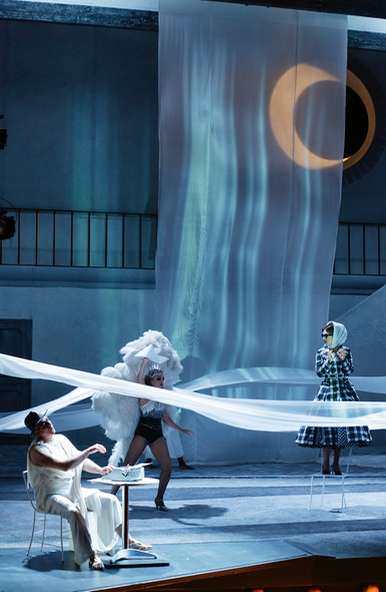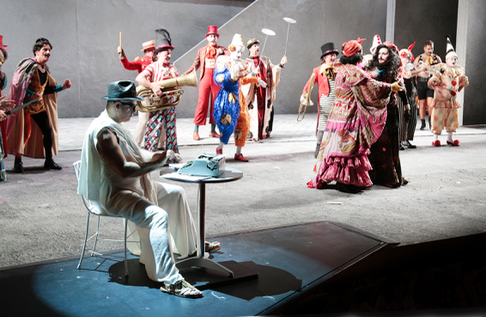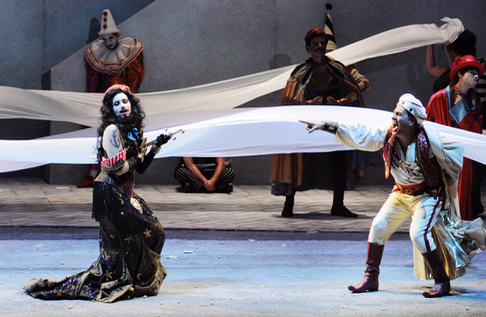
16 Aug 2016
Turco in Italia in Pesaro
When more is definitely more, and less would indeed be less. Two of the biggest names in Italian theater art collide in an eponymous theater.
English Touring Opera are delighted to announce a season of lyric monodramas to tour nationally from October to December. The season features music for solo singer and piano by Argento, Britten, Tippett and Shostakovich with a bold and inventive approach to making opera during social distancing.
This tenth of ten Live from London concerts was in fact a recorded live performance from California. It was no less enjoyable for that, and it was also uplifting to learn that this wasn’t in fact the ‘last’ LfL event that we will be able to enjoy, courtesy of VOCES8 and their fellow vocal ensembles (more below …).
Ever since Wigmore Hall announced their superb series of autumn concerts, all streamed live and available free of charge, I’d been looking forward to this song recital by Ian Bostridge and Imogen Cooper.
The Sixteen continues its exploration of Henry Purcell’s Welcome Songs for Charles II. As with Robert King’s pioneering Purcell series begun over thirty years ago for Hyperion, Harry Christophers is recording two Welcome Songs per disc.
Although Stile Antico’s programme article for their Live from London recital introduced their selection from the many treasures of the English Renaissance in the context of the theological debates and upheavals of the Tudor and Elizabethan years, their performance was more evocative of private chamber music than of public liturgy.
In February this year, Albanian soprano Ermonela Jaho made a highly lauded debut recital at Wigmore Hall - a concert which both celebrated Opera Rara’s 50th anniversary and honoured the career of the Italian soprano Rosina Storchio (1872-1945), the star of verismo who created the title roles in Leoncavallo’s La bohème and Zazà, Mascagni’s Lodoletta and Puccini’s Madama Butterfly.
Evidently, face masks don’t stifle appreciative “Bravo!”s. And, reducing audience numbers doesn’t lower the volume of such acclamations. For, the audience at Wigmore Hall gave soprano Elizabeth Llewellyn and pianist Simon Lepper a greatly deserved warm reception and hearty response following this lunchtime recital of late-Romantic song.
Collapsology. Or, perhaps we should use the French word ‘Collapsologie’ because this is a transdisciplinary idea pretty much advocated by a series of French theorists - and apparently, mostly French theorists. It in essence focuses on the imminent collapse of modern society and all its layers - a series of escalating crises on a global scale: environmental, economic, geopolitical, governmental; the list is extensive.
For this week’s Live from London vocal recital we moved from the home of VOCES8, St Anne and St Agnes in the City of London, to Kings Place, where The Sixteen - who have been associate artists at the venue for some time - presented a programme of music and words bound together by the theme of ‘reflection’.
'Such is your divine Disposation that both you excellently understand, and royally entertaine the Exercise of Musicke.’
Amongst an avalanche of new Mahler recordings appearing at the moment (Das Lied von der Erde seems to be the most favoured, with three) this 1991 Mahler Second from the 2nd Kassel MahlerFest is one of the more interesting releases.
‘And there was war in heaven: Michael and his angels fought against the dragon; and the dragon fought and his angels, And prevailed not; neither was their place found any more in heaven … that old serpent … Satan, which deceiveth the whole world: he was cast out into the earth, and his angels were cast out with him.’
If there is one myth, it seems believed by some people today, that probably needs shattering it is that post-war recordings or performances of Wagner operas were always of exceptional quality. This 1949 Hamburg Tristan und Isolde is one of those recordings - though quite who is to blame for its many problems takes quite some unearthing.
There was never any doubt that the fifth of the twelve Met Stars Live in Concert broadcasts was going to be a palpably intense and vivid event, as well as a musically stunning and theatrically enervating experience.
‘Love’ was the theme for this Live from London performance by Apollo5. Given the complexity and diversity of that human emotion, and Apollo5’s reputation for versatility and diverse repertoire, ranging from Renaissance choral music to jazz, from contemporary classical works to popular song, it was no surprise that their programme spanned 500 years and several musical styles.
The Academy of St Martin in the Fields have titled their autumn series of eight concerts - which are taking place at 5pm and 7.30pm on two Saturdays each month at their home venue in Trafalgar Square, and being filmed for streaming the following Thursday - ‘re:connect’.
The London Symphony Orchestra opened their Autumn 2020 season with a homage to Oliver Knussen, who died at the age of 66 in July 2018. The programme traced a national musical lineage through the twentieth century, from Britten to Knussen, on to Mark-Anthony Turnage, and entwining the LSO and Rattle too.
With the Live from London digital vocal festival entering the second half of the series, the festival’s host, VOCES8, returned to their home at St Annes and St Agnes in the City of London to present a sequence of ‘Choral Dances’ - vocal music inspired by dance, embracing diverse genres from the Renaissance madrigal to swing jazz.
Just a few unison string wriggles from the opening of Mozart’s overture to Le nozze di Figaro are enough to make any opera-lover perch on the edge of their seat, in excited anticipation of the drama in music to come, so there could be no other curtain-raiser for this Gala Concert at the Royal Opera House, the latest instalment from ‘their House’ to ‘our houses’.
"Before the ending of the day, creator of all things, we pray that, with your accustomed mercy, you may watch over us."

When more is definitely more, and less would indeed be less. Two of the biggest names in Italian theater art collide in an eponymous theater.
That’s Gioachino Rossini and Federico Fellini in Pesaro’s historic Teatro Rossini. Italian director Davide Livermore (that’s lee-vair-MOR-aye) unabashedly re-wrote Fellini’s Lo scieco bianco (The White Sheik) and 8 1/2 as Rossini’s Il Turco in Italia, or maybe it’s the other way around. All your favorite characters were present: the sheik himself, Guido (Marcello Mastroiani) as the film director, the whore Saraghina, the priest(s) and cardinal, the glamorous mistress(s), the bearded lady, the showgirls, and probably many more characters you and I may have forgotten since the 1960’s.
Rossini’s world became Fellini’s and Fellini’s world became Rossini’s. Prosdocimo’s play got written (with a lot of help from his actors), and Fellini’s film got made. Davide Livermore brought it all together adding the perfect physical comic schtick that matched up perfectly with the musical pace of Rossini’s masterpiece. And was funny to boot, sometimes really funny, like the mute Saraghina’s dominatrix relationship with the tenor priest Narciso.
 Paolo Spagnolo as Prosdocimo in Act I costume, Pietro Adaini as Albazar, Cecilia Molinari as Saida with members of the Chorus of the Teatro della Fortuna M. Agostini
Paolo Spagnolo as Prosdocimo in Act I costume, Pietro Adaini as Albazar, Cecilia Molinari as Saida with members of the Chorus of the Teatro della Fortuna M. Agostini
Surprisingly all this was not too much, given that Rossini’s librettist Felice Romani had already complicated a really simple comic situation with an absurdist pre-Pirandello intuition, like the metatheatrical Six Charactors. Just as Fellini’s films are laden with images that abstractly create a real world that is imaginary so does Livermore’s opera, a world that we feel and understand but that would take volumes to define. Finally Livermore lays out Rossini’s mixture of error and truth in the same way as had Fellini.
Like some of the American film critics of the time (1963) opined the film 8 1/2 misses touching the heart or moving the spirit, that it’s structure is incomprehensible, and finally that it was a plain out fiasco. This of course can be said of Livermore’s masterful staging. It was far more an intellectual game than a honest rendering of comic and sentimental truths of Rossini’s opera.
Roman born, Juilliard trained opera coach turned conductor Speranza Scappucci was in the pit with the Filarmonica Gioachino Rossini. This brilliant young conductor provided the control needed to keep the bedlam on the stage comprehensible. It was solid music making, with the possibility of inspired music making far beyond what could be expected or even wanted. Her tempos were moderate, patter was measured, the Rossini “boil” or ‘buzz” was never fully achieved, and the unique Rossini joy of singing was absent. But the event was about Fellini, and it was spectacular.
The question looms — what was the understanding and pleasure of those (few) of later generations sitting in Teatro Rossini for whom Fellini films are not part of their general culture?
 Erwin Schrott as Selim recognizing Cecilia Molinari as Zaida in Act I
Erwin Schrott as Selim recognizing Cecilia Molinari as Zaida in Act I
The greatest charm of the evening was the sheik Selim, sung by Uruguay born, Italian trained baritone Erwin Schroit [FYI former partner of Anna Netrebko] who had no more to do than walk onto the stage to steal the show. He reinforced the physical mannerisms of Fellini's White Sheik with powerful voice, simply making the world turn about him. This made it all the more fun for Prosdocimo to try to lay out his comedy, which veteran Italian baritone Pietro Spagnoli did with equal panache and volume, if not with such overwhelming charm.
The third anchor of the comedy was Narcisco sung by young American tenor René Barbera whose priestly presence was complicated by his masochistic relationship with Saraghina and his travestimento as the sheik for the masked ball. True blue chip casting held sway with Nicola Alaimo, Pesaro and Monaco’s William Tell as the cuckolded husband, Geronio, this artist’s famous girth bouncing lightly in a graceful tumble when kicked over by Fiorella.
Fiorella was impersonated to great effect by Russian soprano Olga Peretyatko, who like her portrayal of the same role at the 2014 Aix Festival succeeded as the character without assuming the stature of voice or technique to bring the role fully to life. Young Italian mezzo-soprano Cecilia Molinari, a participant in the Rossini Festival’s Accademia held her own as a bearded Zaida. Her side kick Albazar was sung by cross-dressed tenor Pietro Adaini who was wittily hauled off the stage during his aria by stagehands preparing the movie set for the finale.
Michael Milenski
Cast and production information:
Selim Erwin Schrott, Fiorilla Olga Peretyatko, Geronio Nicola Alaimo, Narciso René Barbera, Prosdocimo Pietro Spagnoli, Zaida Cecilia Molinari, Albazar Pietro Adaini
Coro del Teatro della Fortuna M. Agostini; Filarmonica Gioachino Rossini. Conductor: Speranza Scappucci; Stage Director and Set Design: Davide Livermore; Videodesign: D-WOK; Costumes: Gianluca Falaschi; Lighting: Nicolas Bovey. Teatro Rossini, Pesaro, Italy, august 12, 2016.